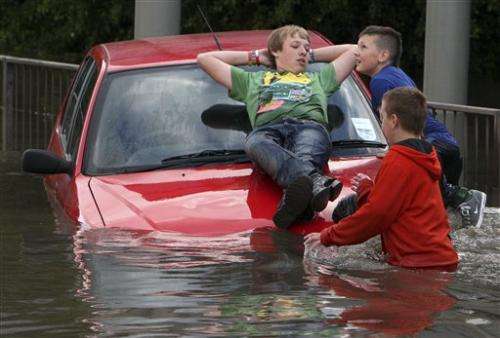Scientists: Soggy British weather likely to stay

The best advice for visitors to Britain—pack an umbrella—is more vital than ever.
Weather scientists said Tuesday that a country that has been unusually soggy in recent years is not likely to dry out soon, and a warm Atlantic Ocean may be to blame.
Meteorologists and climate scientists from around Britain met to discuss why this traditionally temperate country has recently experienced icy winters, the coldest spring in half a century and a string of washed-out summers.
University of Reading meteorology Professor Stephen Belcher, who chaired the workshop organized by Britain's Met Office weather-forecasting agency, said evidence suggests Britain may be in the midst of a 10- to 20-year cycle of wet summer weather that started in 2007 and should end "in the next five to 10 years."
The culprit is the jet stream, the narrow band of fast-moving wind which flows west to east across the Atlantic. It has dipped to the south, hovering over Britain and bringing soggy weather with it.
"The workshop was all about trying to understand what gives us the position of the jet stream," Belcher said. "It is a random process ... but there are some contributors that can load the dice."
He said new research gives insights into the effect on the atmosphere of patterns of warm and cold water in the Atlantic Ocean.
Adam Scaife of the Hadley Centre climate-change research facility said that for the past few summers "we had conditions in the northernmost Atlantic that were much warmer than normal."
"That shifts the odds slightly in favor of this summer being wetter than the historical average," he said.
Similar runs of wet summers also occurred in the 1880s and the 1950s, and Belcher said more research is needed to determine whether the current changes are the result of natural variability, or of human-driven climate change.
Tuesday's conference was convened after three distinctly unusual recent seasons caught scientists' attention.
The winter of 2010 brought snow and ice to areas such as southern England that had long escaped freezing temperatures.
The Met Office says the summer of 2012—a seemingly endless parade of cool, rainy days—was the second-wettest in a century, and last year overall was the second-wettest on record.
And this spring was the coldest since 1962.
"None of these events in themselves are unprecedented," Belcher said—but taken together they led scientists to ask "whether something has changed."
He said that much remains unknown, with the cause of the cold winters less clear than for the wet summers.
One theory that needs more study is the role played by disappearing Arctic sea ice.
Most scientists agree that the Earth's temperature is increasing because of emissions of heat-trapping greenhouse gases such as carbon dioxide.
The Arctic is getting hotter more quickly than any other part of the globe, and experts predict the region will be free of sea ice during the summer within about 20 years. Sea ice is important because it keeps the rest of the world cooler, and some scientific studies suggest that its melting may be indirectly connected to extreme weather in the U.S. and Europe in the past few years.
Amid the uncertainty, forecasters had some short-term good news for weather-weary Britons—Wednesday and Thursday are expected to be the hottest days of the year so far.
© 2013 The Associated Press. All rights reserved.




















